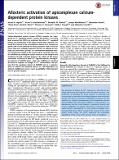Allosteric activation of apicomplexan calcium-dependent protein kinases
Author(s)
Ingram, Jessica R.; Markus, Benedikt M.; Mandelbaum, Joseph; Ramek, Alexander; Shan, Yibing; Shaw, David E.; Lourido, Sebastian; Schwartz, Thomas; Ploegh, Hidde; Knockenhauer, Kevin Edward; ... Show more Show less
DownloadIngram-2015-Allosteric activatio.pdf (1.653Mb)
PUBLISHER_POLICY
Publisher Policy
Article is made available in accordance with the publisher's policy and may be subject to US copyright law. Please refer to the publisher's site for terms of use.
Terms of use
Metadata
Show full item recordAbstract
Calcium-dependent protein kinases (CDPKs) comprise the major group of Ca[superscript 2+]-regulated kinases in plants and protists. It has long been assumed that CDPKs are activated, like other Ca[superscript 2+]-regulated kinases, by derepression of the kinase domain (KD). However, we found that removal of the autoinhibitory domain from Toxoplasma gondii CDPK1 is not sufficient for kinase activation. From a library of heavy chain-only antibody fragments (VHHs), we isolated an antibody (1B7) that binds TgCDPK1 in a conformation-dependent manner and potently inhibits it. We uncovered the molecular basis for this inhibition by solving the crystal structure of the complex and simulating, through molecular dynamics, the effects of 1B7–kinase interactions. In contrast to other Ca[superscript 2+]-regulated kinases, the regulatory domain of TgCDPK1 plays a dual role, inhibiting or activating the kinase in response to changes in Ca[superscript 2+] concentrations. We propose that the regulatory domain of TgCDPK1 acts as a molecular splint to stabilize the otherwise inactive KD. This dependence on allosteric stabilization reveals a novel susceptibility in this important class of parasite enzymes.
Date issued
2015-09Department
Massachusetts Institute of Technology. Department of Biology; Whitehead Institute for Biomedical ResearchJournal
Proceedings of the National Academy of Sciences
Publisher
National Academy of Sciences (U.S.)
Citation
Ingram, Jessica R., Kevin E. Knockenhauer, Benedikt M. Markus, Joseph Mandelbaum, Alexander Ramek, Yibing Shan, David E. Shaw, Thomas U. Schwartz, Hidde L. Ploegh, and Sebastian Lourido. “Allosteric Activation of Apicomplexan Calcium-Dependent Protein Kinases.” Proc Natl Acad Sci USA 112, no. 36 (August 24, 2015): E4975–E4984.
Version: Final published version
ISSN
0027-8424
1091-6490